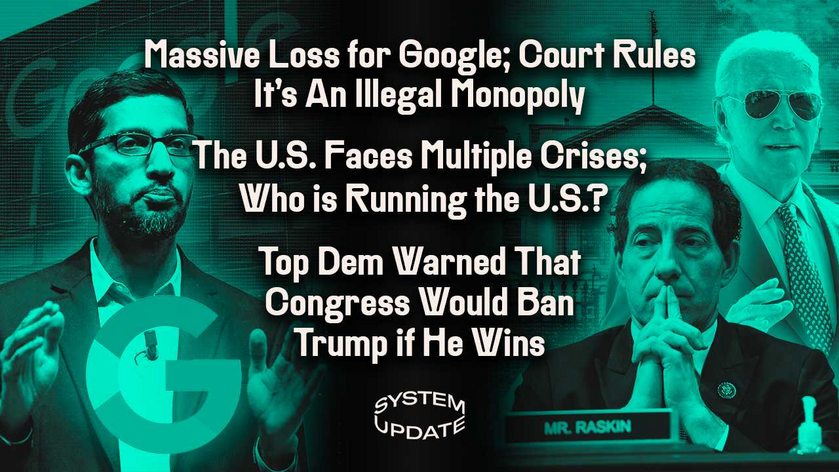Watch the full episode HERE
Good evening. It's Monday, August 5.
Tonight: a federal district court in the District of Columbia has ruled against Google and in favor of the United States government in the most significant antitrust ruling since the emergence of Big Tech. In 2020, the Trump Justice Department sued Google and the federal court in Washington, alleging that Google is an unlawful monopoly both with regard to its search engine and its advertising business and that Google has been unlawfully abusing that monopolistic power to harm the consumer and deny all the public any choice all to benefit itself. The case was brought by the Trump department but continued and pursued by the Biden Justice Department.
The ruling by federal Judge Amit Mehta was issued only after the government and Google exchanged massive amounts of documents and data, and after a nine-week trial was held that began back in October of 2023, involving dozens of witnesses, specialists, expert witnesses and leaders of most Big Tech companies.
This ruling is certain to have major implications for not only Google but for the tech industry at large and American corporatism in general. Judge Meta will next decide what the punishment for Google should be, which could range from massive fines to preventing future violations, to even breaking up Google. The decision will almost certainly be appealed, which means absent a settlement between the company and the government, it will likely take years for the court proceedings to resolve fully. But there is no doubt that this is a monumentally consequential decision, with massive repercussions for the tech industry, Big Tech, and corporations in general. We’ll tell you about the key parts of this ruling, then speak with one of the nation's most knowledgeable and intrepid specialists in antitrust law, who has written volumes about Google's monopolistic abuses. He is Matt Stoller of the American Economic Liberties Project, who will help us break down all of the implications and consequences of today's remarkable ruling.
Then: the U.S. and the world now face multiple major crises all at once. The Middle East is on the brink of a potentially major regional war, with the U.S. today deploying even more military assets to that region to protect Israel. In the case that happened, just an hour ago or so, reports emerged that at least several American troops stationed in Iraq – yes, we do still have troops stationed in Iraq – were severely injured, at least by what appears to be a bomb or a drone or a missile launch by Iran, obviously escalating tensions further. Meanwhile, the global markets tumbled today after a new unemployment report generated fears of declining American economic growth. The U.S. stock market today witnessed its sharpest one-day drop since 2022, while Japan's stock market plummeted 12.4%, larger than its Black Monday crash in 1987. Meanwhile, reports over the last week strongly suggest that Ukraine's frontline – remember them? Ukraine and Russia? – their front line is again crumbling and withering under sustained Russian offenses. All of this again provokes the seemingly obvious and rather important question, namely, with Joe Biden so mentally addled that his own party forced him out of the race against his will, and with the sitting vice president, Kamala Harris, obviously focusing solely on her attempt to replace him in November, who was making all these decisions about, say, the U.S. willingness to involve itself in a major Middle East war on behalf of Israel or our response to this global market crisis? The virtually complete media indifference to this question continues to be remarkable. So, we will take a look at it.
And then finally: various tweets and recorded interviews with a top House Democrat, Rep. Jamie Raskin, have emerged in which the Maryland Democrat warns the nation –repeatedly – that Congress not only could but should and perhaps will declare Donald Trump ineligible to assume the Oval Office even if he wins the 2024 election. While noting that such an attack could provoke what he calls a “civil war,” certainly, at the very least, a possibility, Rep. Raskin nonetheless leaves no doubt that he would urge and support such a measure in the event that the Democrats lose. Yet again, nothing is stranger than the Democratic Party of all things, casting itself as the sole guardian of democracy.
For now, welcome to a new episode of System Update, starting right now.






















